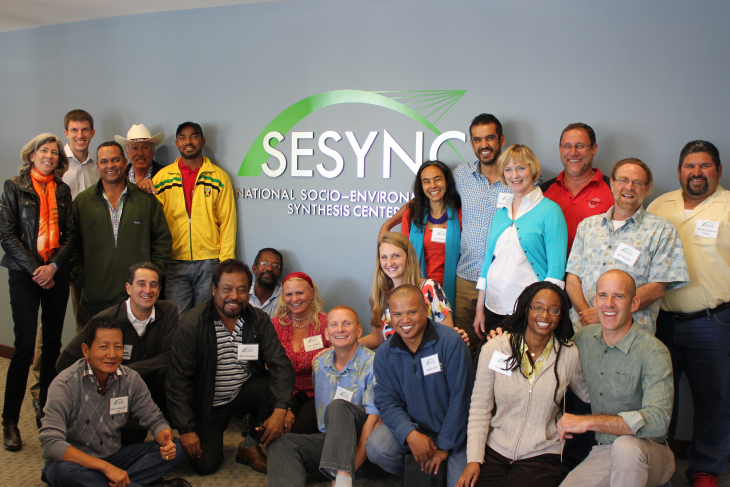What does sustainability mean to you? To SESYNC, it can mean meeting human needs in an equitable way, while supporting the natural systems upon which present and future life depends. This concept of sustainability is especially relevant when applied to our appetite for seafood: in many instances, we are harvesting fish stocks faster than they can reproduce and catching unwanted or unsellable species, called “bycatch,” that are discarded.
Overfishing is a major socio-environmental problem within the marine realm—it’s jeopardizing both ocean ecosystems and the food security of the billion-plus people that depend on seafood as their primary source of protein. Over the past several decades, we have come to understand that the oceans’ bounties are in fact highly sensitive and terminable. People from every corner of the globe have responded by making positive changes from ocean to table, implementing sustainable fishing practices and making informed, sustainable consumer choices at restaurants and stores.
One of the most effective tools for improving the vitality of fisheries has been to foster communication between fishers and other fisheries stakeholders. That’s where SESYNC researchers Lekelia (Kiki) Jenkins and S. Hoyt Peckham come in.
Earlier this month, Drs. Jenkins and Peckham hosted a workshop at our Annapolis facility to identify lessons learned for how to best organize and conduct fisher learning exchanges—meetings that provide fishers with the opportunity to share challenges and solutions—and to develop a research plan for determining which elements of these exchanges lead to conservation outcomes. Because fisher exchanges are produced all over the world, Drs. Jenkins and Peckham were also interested in conducting comparative analyses, as well as bridging these communities—from Mexico to Malaysia and Madagascar to the Caribbean—to establish an international network of learning exchange practitioners.
This workshop, which comprised participants and organizers from the fisheries, as well as the academic, NGO, and governmental sectors, had actionability on their minds: workshop products should have a real application beyond their research relevance. In their 2½ days together, participants outlined a guide for practitioners to create their own learning exchanges, as well as a research plan to empirically identify best practices through comparative research of ongoing exchanges. Both address the ultimate socio-environmental goal of improving both marine ecosystem health and the wellbeing of fisher communities.
At SESYNC, the core staff had a lot of fun as flies on the wall, watching the interactions between group members and how they used the open space of our facilities. In one of the most meaningful moments for participants during the workshop, the group collected around the kitchen to share personal stories about their experiences with learning exchanges and the successes they’ve seen borne of them. The profound, shared impact of these individuals’ work laid the framework for building communities amongst fishermen and organizers of fisher exchanges—the central objective defined by Drs. Jenkins and Peckham in their workshop proposal.

